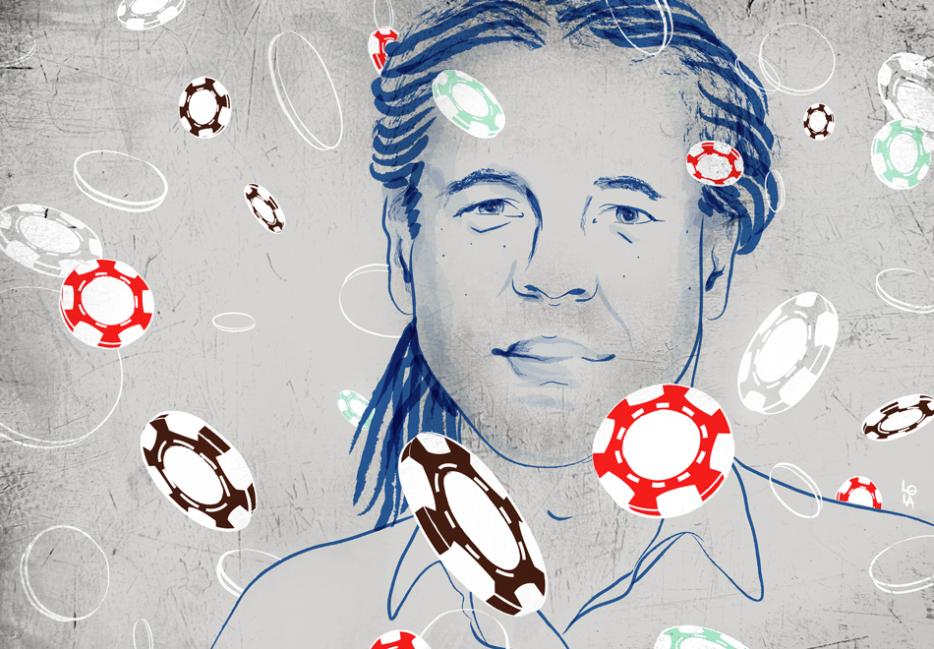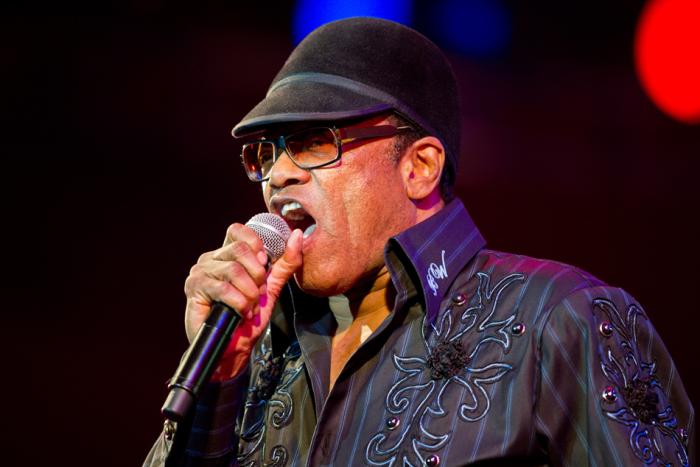People will tell you they’re no good at poker because they’re no good at lying. The legendary actress Gena Rowlands, so persuasive and charismatic on screen, said as much herself: “I can never have a poker face. Anybody looking at me can tell exactly what I’m thinking.” Her son, the director Nick Cassavetes, would go on to place fifth overall in the 2007 World Poker Tour. The face he inherited from his mother was fit for poker, because a good poker face has nothing to do with lying. The best players aren’t affectless, per se; they’re just really fucking bored.
Even in the very amateur, sub-bush league home games11I learned Hold ‘Em early in my adult life in order to spend more time with men, a scenario sweetened by the exciting benefit of sometimes taking their money. I’ve been in, boredom is always in play. Unless they’re really good, conversations tend to peter out after a couple of hours. I’m not a great player—I put too much faith in face cards and have a mercurial relationship with betting strategy—but my inborn aptitude for long-haul sitting is certainly put to good use at the card table.
As Colson Whitehead writes in his latest book, The Noble Hustle, “Quite a few things about poker reminded me of the writing life. Like, you sat on your ass all day.”
The School of Cards, an organization founded by poker pro Blake Eastman to teach the arts of poker and blackjack, offers a video tutorial on beating boredom at the table. “I dunno,” Eastman advises. “Go get a steak or something like that, and then come back and play.” There’s only so much to do when faced with ennui, in even the best gambling towns. Some people eat a steak, or go for a smoke. Other people make up stories.
*
When I spoke with Whitehead about The Noble Hustle over the phone, I was struck by his reticence. He was friendly and quick to laugh, but I got a sense that he was somehow hanging back. I asked him about writing, publishing, and poker. I asked him if learning from pro players amped up his fiction game. Listening to the tape, it occurs to me that he may have thought I was being facetious. I was not.
Colson Whitehead: I think the jokey comparisons between poker and writing are definitely true. You sit at a poker table, technically with other human beings, but you can just be a hermit and not say anything. You’re sitting on your butt all day, and you’re working. No one can see your daily process.
Emily M. Keeler: Is there an imperative for a player, once they’re in a game, to keep going, even if it’s a crappy hand or intimidating scenario?
Colson Whitehead: There’s the often vain hope that the next hand will be the one that fixes you, despite all evidence. For me, I have no choice but to write the book I’m gonna write each time out.
*
The Noble Hustle is a short book based on a series of magazine features. In 2011, Grantland gave Colson Whitehead $10,000 to play in, and report on, the World Series of Poker; a self-avowed home game enthusiast, he couldn’t possibly say no. “Having someone pay [me] all that money to go to Las Vegas,” he said, “was too hard to pass up.”
The World Series of Poker began as a small game for big players in the historic, family-owned Binion’s Horseshoe Casino in 1970. The casino was smaller than the big-box fantasy lands that line the strip, and attracted serious gamblers, a vastly different clientele from the middle-class tourists coming through for any given weekend. The World Series of Poker was born of the desert, not the mirage.
Al Alvarez, the progenitor of the literary-writer-becomes-obsessed-with-professional-poker-genre of memoir,22Select entries in this genre: Frederick Barthelme’s book with his brother Steven, Double Down (1999); Poker Nation (2003) by Andy Bellin, a onetime editor for The Paris Review; James McManus’s Positively Fifth Street (2004), a book that also began with an assignment to cover the WSOP for a magazine—Harper’s—though McManus didn’t tell his editors he’d be using his advance to enter the tournament (it paid off and he won big); literary critic and biographer Anthony Holden’s two poker memoirs, Big Deal (1990), and (yes) Bigger Deal (2007). described a typical scene from the tournament’s earlier days in The Biggest Game in Town: “The game just inside the rail seemed to have been going on all night. The players were gray-faced and unshaved. They shifted about in their seats, yawned, scratched vaguely at their grubby shirts, lit one cigarette from the stub of another. They looked, most of them, like the uneasy sleepers on benches in railway stations, sitting there because they could not raise the price of a hotel room.”
The early days of the WSOP were an adventure strictly for gambling insiders, but 2011 was an important year for the game—68,807 players entered the tournament. With the advent of online tournament play, and the invention, in 1999, of the “hole cam”—a camera under a glass panel in the table that allows the audience and announcers to see each player’s hand—poker’s worldwide popularity was growing faster than Vegas itself. For the first time in 42 years, the WSOP received nearly live coverage: television cameras appeared at many tables, with recap and reaction booths in the lobby. ESPN allotted twice as much air time as it had in prior years, including online streaming for several of the title events, and of course, Grantland’s coverage.
Throughout Noble Hustle, a reader gets the sense that the gritty glamour of the poker world has not so much faded as been scrubbed away. Glamour or no, brick-and-mortar tournaments are on the rise.
*
Emily: Would you want to go back to Vegas?
Colson: Oh, Vegas, oh yes, all the time. I’ll go there anytime! I think for the World Series...Ten days is a long time, but three days is perfect.
Emily: I’ve actually never been to Vegas. It seems like a frightening place, to me.
Colson: No, it’s totally harmless. When I was 21 I found it very campy and kitschy, but by my second time there I found that it’s just a place and you make of it what you will. They’re not trying to break you, they’re not trying to give you social diseases. They want you to have a good time and they want you to come back.
*
Social diseases be damned, Whitehead had just six weeks to train for the Word Series, so he took the bus from New York to Atlantic City to practice sitting still for long periods of time.
From the opening pages, Whitehead develops a conceit to reify his headspace at the time: the Republic of Anhedonia, an imaginary country from which he narrates his successes and failures at cards. “No one has deigned to write down our history, but we are an ancient land,” he writes, “founded during the original disappointments, when the first person met another person.” A joke built on lighthearted misanthropy becomes a meme throughout his WSOP experience. He has the fake nation’s flag emblazoned on his poker jacket: two lightning bolts, to signify the despairingly dark skies overhead.
The fictional nation isn’t so foreign to those who’ve read Whitehead’s other books. On the phone, he joked that most of them are about sad people with weird jobs. Whitehead’s writing jumps from the page with a zeal for the intricacies of language, and he makes frequent jokes out of the miserable business of being alive. John Henry Days, Whitehead’s second book after his breakout debut, The Intuitionist, is America as seen by a hack journalist, J. Sutter, hellbent on attending a record number of junkets. Fittingly, the book was shortlisted for a Pulitzer.
A flattening sadness, buoyed by laugh-out-loud wit, runs through most of Whitehead’s work. The MacArthur “Genius Grant” recipient’s most recent novel, Zone One, takes place in a desolate, near future New York City, made otherworldly by a zombie apocalypse. The main character suffers from a tragic psychological condition called Post-Apocalyptic Stress Disorder. In this new book, Whitehead refers to Zone One as somewhat autobiographical: his world may not have ended, but he knows shell shock all the same.
“I was in a very raw place,” Whitehead says, about his mental state while writing The Noble Hustle. The first great punch line of the book is the fact that, shortly after he committed to the tournament assignment, his wife became his ex-wife. When I ask him about the divorce, he guards the details: “That informed the voice of the book, and I was very glad to make these weird jokes about depression, and my neuroses. But I wouldn’t want to be in that particular place again.”
The book’s malaise becomes its primary delight as our plucky, albeit chronically depressed narrator navigates the surprisingly unromantic world of poker, all the while flying his fictional country’s freak flag. Out in the desert, it’s noble to laugh into the abyss. Fun, even.
*
Emily: I want to talk a little bit more about Anhedonia.
Colson: Okay. Let’s.
Emily: If someone actually takes no pleasure in most of life, why play poker?
Colson: Because it affirms your sense of the world. That we’re just continually being ground up by the insane machinery of existence. And so the rules of poker, the capriciousness, confirms the way that you feel about the world.
Emily: Well, that’s bleak.
Colson: Perhaps. That’s how we roll.
Emily: So if playing poker confirms that the world is a bleak place, then why write books? Why make art?
Colson: Well, in my particular case—I guess you can be a depressed surgeon, you can be a depressed veterinarian. It’s my lot to be the depressed writer. We all have our roles to play. Perhaps it’s something to capture a glimpse of the way the world works, in a way. If I can do that, it does sort of numb a bit of the pain.
*
Art saves us from the horrible truth. At the table, most poker pros will pay attention to what is, in the lexicon of the game, called table image, a kind of fiction played as truth. Players construct an artifice around the reality of the pot. From fake tells to calculated calls, to play poker is to feel the pull of disbelief suspended and sustained. “At a higher level, one that’s higher than where I play, you’re sculpting a tournament persona for hours and rounds,” Whitehead says.
It all sounds suspiciously like writing to me. At the table, the ability to deceive is imperative. Literature, of course, relies on persuading someone to permit themselves to believe, even briefly, in the power of artifice to effect something real. The stakes with art are the same as with poker: will the artifice pay off?
Once he arrived in Vegas, Whitehead met up with poker champion Matt Matros and adopted him as a guru. (Matros would win over $300K and the second poker bracelet33The tournament awards its winners blinged-out gold and diamond bracelets in lieu of trophies for first place in each event. of his career during that same tournament.) The only true grinder44Poker slang for a player who makes most of their living off the game. Matros, who sidelines as a columnist for Card Player magazine, told me that poker is “ the ultimate freelance job. in The Noble Hustle, Matros is renowned as a “math player,” gifted at optimizing his chances through an understanding of game theory and statistics. But Matros first met Whitehead while studying creative writing at Sarah Lawrence, and he pitched himself as a tournament coach based on their shared literary background.
“There’s an inherent narrative to poker. Every hand has a story to it,” Matros says. “As Colson points out, poker players will often talk about how the story that their opponent’s telling has to make sense. That’s one of the key concepts of professional poker, actually. When you’re facing an opponent, and they’re making a bet on the end, really the question you’re asking is: is this bet consistent with the story that was told, with everything else that’s happened up to this point in the hand? And if the logic of the story breaks down—if he wouldn’t have made this bet on the flop if he had the hand he’s trying to pretend he has on the river—then he doesn’t have the hand. It’s that simple. So being able to construct this narrative in your head is what makes a great poker player great.”
Matros wasn’t Whitehead’s first coach. On the recommendation of a member of his home game (which, as far as I can tell, consists of a who’s who55Or should I have said, “murderer’s row”? From what very little I could find out about the private game, players definitely include Jonathan Lethem, Nathan Englander, and Hannah Tinti. (In my imagination, this list also includes Susan Choi, Jennifer Egan, Teju Cole, and Gary Shteyngart.) of Brooklyn writers), Whitehead hooked up with novelist and semi-pro poker player Helen Ellis almost as soon as he took on the assignment. Her cheery, gung ho disposition and Southern, ladylike charm make for a complex and hilarious pairing with Whitehead’s profligate glumness.66I asked her about Whitehead’s Anhedonia conceit: “You know it’s very difficult for me, because I love poker. I just love it. I was in Atlantic City last week and I played for 14 hours straight, I was playing to qualify for their big main event. I was what you call the bubble girl, meaning that eight people got paid, and the ninth person through the hundredth person got nothing. And I was the ninth player left when I busted. So if I had made it one more spot I would’ve won. And still, I walked away happy. I just love it. It’s very hard for me to wrap my head around the dead-inside feeling. I’m sorry! I’m a happy little lady! Throughout the book, Whitehead calls Ellis—who is (accurately) portrayed as almost comically infatuated with poker—”Coach,” and writes that the “Alabama in her voice was strong.” It still is.
Whitehead points out that she makes a particularly apt coach for him, given that both of them bring to the table an appearance outside the poker norm; most players are white men in hoodies and sneakers. Ellis, in her Tory Burch shirtdresses and pearls, and Whitehead, with his dreadlocks and air of deadpan despair, break the mould. Furthermore, there’s an advantage in coming to the game with a non-standard perspective. “As a writer and as a woman,” Ellis says, “I kind of expect people to be lying to me all the time.” Because poker relies on the analysis of imperfect information, conventional players can get too confident in their assessments of other players, whereas a person coming in with a relatively unique personal and poker background can jam the game.
The importance of narrative is also what makes Texas Hold ‘Em especially difficult to computerize. There are exactly 1,326 possible starting hands, but the game, like the people who play it, is an assemblage of imperfect information. There is no existing algorithmic function for imagination.
*
Not to spoil anything, but Whitehead didn’t win big back in 2011. Ellis told me she was mostly just proud that he didn’t bust out on his first day. The experience, for the most part, seems pretty uneventful in retrospect—playing pro poker, it turns out, comes with the tedium of pretty much any other contemporary occupation. Perhaps the stakes were never quite high enough to begin with, in the newly sanitized and televised poker world.
Whitehead has since found some sort of joy (or at least, one presumes, love; he’s married now), though judging by his Twitter account and the interviews he’s done around this book, he’s holding onto his sad-sack table image. Nonetheless, by the end of Noble Hustle, Whitehead’s anhedonian suffering is spun into a certain kind of success story. He loved, he lost, and he went home a slightly different player than when he left, one with a full accounting of his own misery. It’s the stuff of legend: a story made for him to write, whatever the dead-eyed boredom at the desk or poker table.






